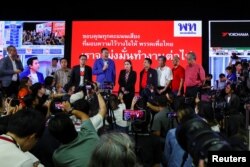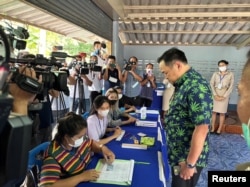The surprise win of Thailand's Move Forward Party in national elections Sunday and its radical pro-democracy agenda marks a watershed moment in the country's politics and a strong rebuke of nine years of military or military-backed rule, analysts say.
But parliamentary rules drafted by the military after a 2014 coup that favor pro-military candidates, they add, could still leave the party with the most popular votes out of the next government.
In the coming days, weeks or even months of horse trading as parties jockey for allies to form a winning coalition, "anything could happen," said Titipol Phakdeewanich, dean of the political science faculty at Thailand's Ubon Ratchathani University.
In a nationwide race to fill the 500-member House of Representatives, the youth-facing Move Forward Party finished ahead of the pack with 151 seats by promising reforms to curb the conservative royalist and military establishment's long-running grip on power. The Election Commission announced complete, unofficial results early Monday morning.
Pheu Thai, the latest political vehicle of the billionaire Shinawatra family and longtime rivals of the same conservative establishment, finished a close second with 141 seats, while Bhumjaithai, a party that has made legalized cannabis its defining issue, came in third with 71.
Palang Pracharath and the United Thai Nation, the two main pro-military parties in the race, won 40 and 36 seats, respectively. Prayuth Chan-ocha, United Thai's candidate for prime minister, is also the incumbent and, as a general, led the 2014 coup that ousted an elected Pheu Thai government. Palang Pracharath's candidate for prime minister, Prawit Wongsuwon, another ex-general, was by his side for the putsch.
Move Forward's resounding win Sunday "represents a turning point in Thai politics," said Napon Jatusripitak of the Singapore-based ISEAS-Yusof Ishak Institute.
The party had been polling behind Pheu Thai early on, projected to do best in urban areas packed with younger voters, but saw a surge in support in the final weeks of the race.
"So, they actually managed to not only fulfill expectations, they also went beyond that and win seats where we don't expect them to, which is the rural areas. And I think that in itself is a referendum that ... there's a certain readiness for change," said Napon. "It's a rejection of Thailand's conservative status quo, basically."
Beyond that, he added, it also marks a break with the binary, patronage politics that have defined Thailand for the past two decades, split between parties either fronted or backed by the Shinawatra family pushing populist, pro-poor policies and the conservative forces that have ousted their governments three times, either by coup or court order. Sunday's election was the first a Shinawatra party has not won since 2001.
Titipol said Move Forward's come-from-behind win owes much to its focus more than any other party, even Pheu Thai, on reforms that would fundamentally weaken the military and monarchy's political sway. It has proposed ending military conscription, reallocating some of the defense budget to social programs, and curbing royal defamation laws that can land offenders in jail for up to 15 years per slight.
"That is another reason for their victory, because most people are now also talking about the restructuring of Thai political power," Titipol said. "This actually indicates that people want to reform the structure of power."
Move Forward's next challenge is to elect a prime minister in the parliamentary vote to come and form a government.
Analysts say Pheu Thai would make the most natural ally, and their combined seats would give them a majority of the House of Representatives. Each party has already said it was open to teaming up with the other.
Under rules pushed through by Prayuth's military junta after the 2014 coup, though, any candidate for prime minister must win a combined majority of both the House and 250-seat Senate. The current Senate was appointed by the same junta and voted for Prayuth for prime minister after elections in 2019, even though Pheu Thai had won the most House seats that year.
Without the Senate's support, any coalition of parties will need to pull together at least 376 votes in the House alone. Even combined, Move Forward and Pheu Thai do not have the numbers. As of Monday afternoon, Move Forward told local reporters it had a tentative plan with Pheu Thai and four other parties for a coalition with a combined 309 House seats.
Previously, Move Forward has also ruled out any alliance with either Palang Pracharath or United Thai. Analysts say that would make Bhumjaithai the most likely third party in a Move Forward-Pheu Thai tie-up, along with a few smaller parties and maybe even a handful of breakaway Senators to hit 376.
However, the same staunch reformist bent that propelled Move Forward to victory Sunday could still deny it a place in the next government, said Punchada Sirivunnabood, an associate professor of political science at Thailand's Mahidol University.
She said the party's policies may simply be too radical for most parties and trigger fears of another coup; Thailand has had 13 since the end of absolute monarchy in 1932.
"It's [going to be] really hard for Move Forward to form a coalition government because of their leftist policies, which a lot of political parties cannot accept," said Punchada.
Napon added that corruption allegations hanging over Bhumjaithai could also be used as leverage by conservative forces to stop it from joining any coalition that would bring Move Forward to power.
"And the judicial system and the courts, the electoral commission, all these tend to be heavily influenced by people that are oriented towards the conservative establishment, so they could actually disqualify, dissolve Bhumjaithai," he said.
The courts and commission already have a history of dissolving parties that have posed a threat to the military and monarchy. In 2020 the Constitutional Court dissolved Future Forward, the popular predecessor of Move Forward, over an illegal loan, a charge the party denied.
Naron, Punchada and Titipol all said those pressures could push Pheu Thai into cutting a deal instead with Palang Pracharath, United Thai and others. With Move Forward out of the mix, enough senators could be persuaded to back their alliance and put it over the top.
At a news conference Monday in Bangkok, Move Forward leader Pita Limjaroenrat said he had no reason to doubt the Senate would back his tentative coalition with Pheu Thai and the others.
Analysts are not so sure.
"We could actually see a deadlock and multiple rounds of selection of prime minister" before a new government takes shape, said Napon. "This could drag on for months potentially, but I'm not sure that it will."







